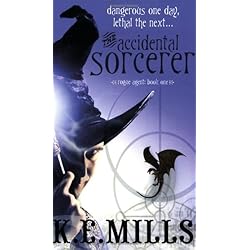A Fantasy World without Footnotes
Character is the first thing I look for when reading, but a definite, clear setting is a close second. Fortunately, I've been on a reading kick lately, and actually have an example that covers both.

The Accidental Sorcerer by K.E. Mills (pseudonym for Karen Miller) has strong characters that are fully part of their entirely fictional fantasy world. Which is especially interesting because I don't think the world is given a name.
I think that indicates how strong a fantasy setting it is. In this book, the first of the Rogue Agent series, three different countries are in play: or rather, primary protagonist Gerald Dunwoody moves from Ottosland to New Ottosland, the colony, which is entirely surrounded by the desert country of Kallarapi.
Never, in any of these settings, is the audience given a rundown of the political system, the laws, the culture or the population statistics. Instead, the characters move through their surroundings, and like people reflect only on what immediately impacts them. So Gerald doesn't really think about how his government operates, but as a third-grade wizard and cog of bureaucracy, we learn about out it operates on a day-to-day level, and more importantly the attitude the government has to its function. Gerald's whole story begins when, at the factory he was sent to inspect , there is an explosion as a result of lax safety standards. Instead of the illustrious company being investigated, Gerald is fired.
Because he is only a third-grade wizard, several self-important first-class wizards go out of their way to make him further miserable--a very clear class structure that is only emphasized by his absent-minded, genius-inclined best friend Monk who is so far up the social ladder that, while he cannot directly get Gerald out of trouble, he can make the others back off. However, when his own stunts go awry, he isn't immune from the consequences.
The focus of the book is Gerald's time in New Ottosland. Unlike the mother country, New Ottosland follows Tradition with the capital "T". They speak the same language, every building is an exact copy, and every king is named Lionel and every queen Melisande--as are the first male and female heir. Gerald's problem is the new King Lionel disbelieves in any need for advisors or anything other than strict obedience.
And war is brewing with Kallarapi, the desert that surrounds New Ottosland. Given descriptions of turbans, camels, and very prominent Holy Men and gods, at first glance, Kallarapi might read as the stereotypical middle-eastern backwards country. But holy man Shugat is, well, if not good, especially to our protagonists, at least right. Kallarapi is a fully independent county--it represents mostly how backwards New Ottosland has become.
The beginning the The Accidental Sorcerer is in many ways whimsical. There's a great deal of witty banter, and wry observations on the fabric of society. But the strongest part of the book, the most moving, is that there really is evil in this world, and no one can be perfectly good.
Evil is human, and there is death--and it actually affects the characters. Someone is tortured, and changed forever. Everyone is actually impacted by the end, and there is no magical healing.